-
About
First-Year Application Deadline
Don't miss your chance to apply to Marist and join the Red Fox Family!
• Early Decision II and Regular Decision: Sunday, Feb. 15About
-
Academics
First-Year Application Deadline
Don't miss your chance to apply to Marist and join the Red Fox Family!
• Early Decision II and Regular Decision: Sunday, Feb. 15Academics
-
Admission & Financial Aid
First-Year Application Deadline
Don't miss your chance to apply to Marist and join the Red Fox Family!
• Early Decision II and Regular Decision: Sunday, Feb. 15Admission & Financial Aid
-
Student Life
First-Year Application Deadline
Don't miss your chance to apply to Marist and join the Red Fox Family!
• Early Decision II and Regular Decision: Sunday, Feb. 15Student Life
- Athletics
A man working in front of the computer
School of Management
School of Management Newsletter: January 2018
Making the Grade
The Marist College MPA program has tied for 51st place on the 2018 list of Best Online Graduate Business Programs published by U.S. News & World Report. The compilation includes all graduate business programs other than MBA, which are listed separately.
The ranking represents a significant uptick in the program’s score, rising 15 spots from its 66th place finish in 2017. Scores are determined by a number of factors, including level of accreditation, faculty credentials and training, student support services, and technology. A multimedia company, U.S. News & World Report has been ranking colleges and their programs since 1983.
Fast Talk
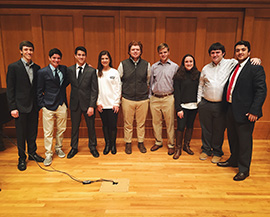
A team made up of first-year students Emily Wells, Dan Defeo and Matthew Hurley took home top honors in the contest. “The winning group pitched a pillow with a built-in alarm, which vibrates to wake up the user,” reports club President Spencer Hogan ’20. “They would most likely market it directly to college students, who are often faced with the issue of being unintentionally awakened by their roommates' alarms. The crowd reacted extremely positively to the idea.” The duo of Steven Ciravolo ’21 and Sam Manowitz ’21 placed second in the contest, while individual competitor Jana Brzovski ’21 was third.
IN THE PHOTO: Elevator Pitch top scorers are congratulated by Business Club President Spencer Hogan ’20 (second from right) and contest judge Daniel Lyons '18
Making Waves
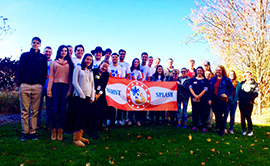
No Horsing Around
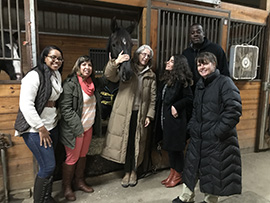
IN THE PHOTO: Prof. Anne Zahradnik (center) introduces her horse, Freetime, to her MPA students
Decisions, decisions
Twenty student teams representing colleges and universities from around the region descended on the Marist campus on November 11 for the 2017 Northeast Regional Ethics Bowl.
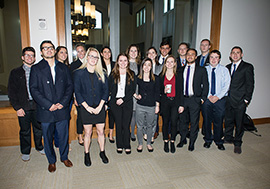
The 12-hour competition “went very well, especially considering we had 20 schools, 26 teams and approximately 250 people,” said Joanne Gavin, associate dean of undergraduate programs and professor of management. A specialist in business ethics, Gavin coaches Marist’s Ethics Bowl contestants. “Teams from Yale, Northeastern, Villanova, Manhattan — as well as two squads from Marist — took part this year,” she said. “Tufts took first place, and West Point came in second.”
Organized nationally by the Association for Practical and Professional Ethics, the regional competition is coordinated by Marist's interdisciplinary Center for Ethics — of which Gavin is a member — and cosponsored by the School of Management and the School of Liberal Arts. This is the second consecutive year that the college has hosted the thought-provoking competition. “With so much positive feedback, the Marist Center for Ethics plans to offer to host [the regional competition] again next year,” Gavin said. “And of course, the SOM will put up another two teams.”
Market Share

Alumni Profile: Michael D. Johnson ’13, MPA ’17
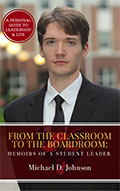
This self-assessment comes as a shock when you take a look at Johnson’s LinkedIn profile. While at Marist, he served as community outreach director for the Student Government Association and was co-director of Marist Up ’Til Dawn, a fundraising initiative benefiting St. Jude Children’s Research Hospital. A lifelong resident of Montville Township, New Jersey, he is currently president of the local chapter of the Kiwanis Club; last month, he completed a three-year term on the town’s board of education. He is the author of the book “From the Classroom to the Boardroom: Memoirs of a Student Leader” and cofounded a website that showcases stories about leadership and civic engagement written by Millennials.
Johnson says his wallflower days came to a screeching halt when he arrived in Poughkeepsie. “When I got to Marist, I realized this was my clean slate,” he says. “I didn’t have to be the shy kid anymore, I could write the story the way I want it to be.” Having some high school experience with community service, he volunteered in student government and found it was “the perfect fit for me. I saw it as a way to advocate for people and bridge perceptions between the student body and the campus administration.” From there, “one door opened after another; before I realized it, I was involved in so many organizations, which led to additional connections and opportunities.”
Johnson earned his B.S. in criminal justice and completed Marist’s paralegal certificate program; currently he works as a paralegal for Dewey, Pegno and Kramarsky in Manhattan. “I came to college with the mindset of becoming an attorney in my hometown,” he says. “But my worldview expanded while at Marist, so my ambitions are a little loftier these days.” When law school began to look less attractive to him, Johnson opted to complete his MPA in public management. “Now I want to pursue an academic or research role in education and criminal justice. What particular shape that’s going to take, I’m still trying to figure out.”
Released on November 1, his self-published book grew out of postgraduate presentations — with friend and classmate Dan Torres — made as part of Marist’s Emerging Leaders Program. “We spoke about our student government experiences and how what we learned connected to our experiences in local government,” he recalls. “We just had so much info to share; we’d get student comments saying, ‘This was great, but I wish there was more time for you to share your stories.’ So I began expanding my notes; once I started, I couldn’t stop. That became my initial manuscript.” Besides illuminating for young people how “the conflicts and questions you encounter as a student leader magnify themselves once you’re out in the real world,” Johnson says the book functions as “a framework about how to handle similar struggles — picking a college, becoming part of a new community, or deciding what to do after high school or college.”
We asked Johnson if he had any advice for current undergrads. “Don’t let anyone else write your story,” he says. “This is your experience to own and control. When you look back on it, you don’t want a story that will knock the socks off someone at your high school reunion, you want your life story to wow you.”
“From the Classroom to the Boardroom: Memoirs of a Student Leader” is available in paperback for $14.99 through Amazon and Barnes & Noble.
Getting to Know… Prof. Thomas Madden

Q: Would you tell us about your career up to this point?
A: My dad was in business, and I started reading contracts when I was about 13 — he’d just toss them to me when he came home with a case full of papers. That piqued my interest in business law, and that was probably why I pursued a law degree. After college, I was interested both in law practice and academic work, and it just took me some time to balance these two interests in one career.
Q: Were you always interested in working in an academic setting?
A: It was something I was considering, having done graduate work after professional school. The academic environment is one that I love. But it was a struggle to meet these multiple interests. Early on, I worked as an adjunct, but with the long-term view toward transitioning to a full-time academic. So I’m really pleased now to have academia be the dominant interest. For so long it was subordinated by the demands of law practice.
Q: Why is this career change taking place now?
A: It was a matter of building experience, as well as feeling that I’d achieved most of what I’d wanted to in my law practice career. I’ve worked in several different environments, from the very largest of firms at Jones Day’s New York office to having my own boutique practice. So I felt that, having had that experience, I could turn my attention more fully to what I’d wanted to do earlier on.
Q: How did you wind up here at Marist?
A: It was just a great opportunity coming at the right time — to have a position at a school that I think is very much on the rise, that offers a great atmosphere and potential for growth.
Q: Why is it important for business students to have knowledge about the law?
A: Increasingly, the competitive advantage of business is intertwined with law and legal concepts. And, together with law, ethical awareness is paramount to me. I try to build an ethics component into my Business Law and Legal Foundations classes; I think ethical awareness is important to have for a successful and rewarding career. It’s particularly poignant in business these days, when we see scandal after scandal hit the news.
Q: What’s one thing you hope your students learn in your class that’s not in the textbook?
A: The importance of critical thinking, and the ability to make and own arguments or analysis and present them to others in a way that’s effective and persuasive.
Q: You’ve only been here since August, but what is your initial impression of Marist?
A: Marist is incredibly welcoming. I felt that when I first visited, and I still feel that now.
